Migrant caravan: Hundreds of Hondurans set off on new trek
- Published

Hundreds of Hondurans, including families with young children, have left on a new trek towards the US
Hundreds of Hondurans have set off on a new migrant caravan towards the United States.
An estimated 500 left early on Tuesday from the bus terminal in the crime-ridden Honduran city of San Pedro Sula.
Another group of about 300 set off a few hours later.
It comes as thousands of Hondurans and other Central Americans remain stranded in Tijuana on the US-Mexico border after they walked for thousands of miles as part of a caravan in October.
US President Donald Trump, who railed against the earlier caravan ahead of the US midterm elections, tweeted on Tuesday that the migrants could only be stopped by a "wall or steel barrier" of the type he has been proposing be built on the US-Mexico border, external.
BBC News Online's Latin America editor Vanessa Buschschlüter travelled to San Pedro Sula and nearby towns to speak to some of those who were leaving and found that while many want to reach the US, some are also heading to Mexico.
'I don't want the gang life' - Josué, 20
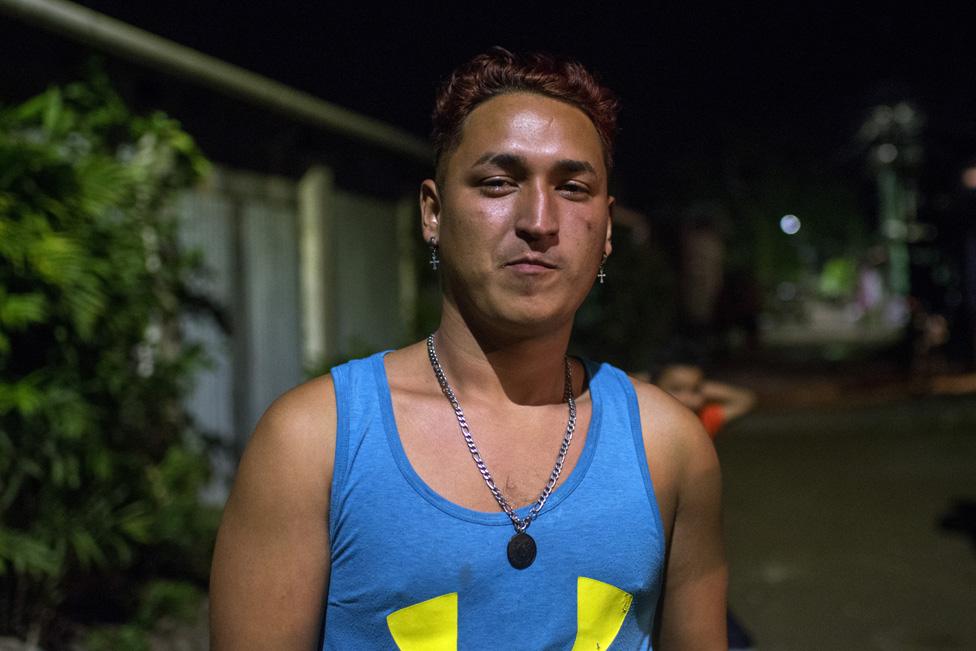
Josué wants to work in the US to save up enough money to build a better home for his family
"The situation here in Honduras has been bad for years. One tries to make it north, that's our dream, because here even when you do have work, what you get paid is only just enough to eat.
"There's no way to earn enough to get a decent place to live. There are four of us in my family and we all live in a wooden shack.
"It's dangerous here. Two rival gangs operate where I live and both have tried to recruit me. They try to paint you a nice picture of gang life but I'm not stupid. I don't want that life for myself. So I have no alternative but to leave because I don't want to get into trouble. God willing, I will make it to the US."
'The gangs want me to sell drugs' - Keilin, 21
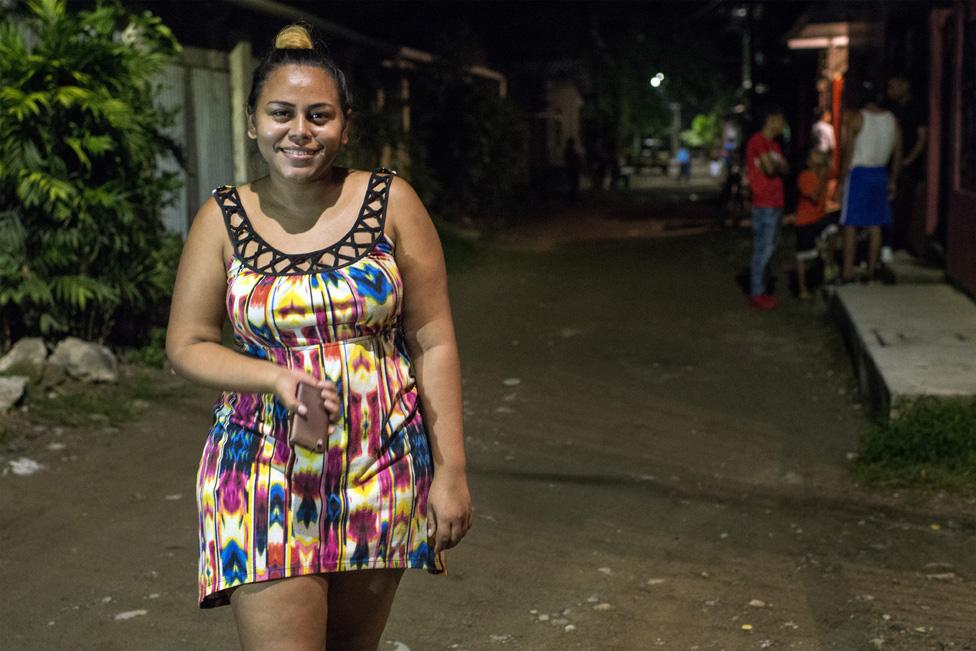
Keilin had already joined one caravan but turned back, now she wants to try again
"I left with the caravan that set off in March [of 2018]. I left because this is not a safe place. There's always police here and gangs and they're always bothering you.
"That's one thing, but there's also the fact that you just can't get work. Some [employers] tell you you're too young, others that you're too old. Before I left, I'd been out of work for two years. I live with my 81-year-old granny and we're living off the money an uncle of mine was giving us.
"My goal was to make it to the US but when I got to Tijuana [on the US-Mexico border], the lawyers [from NGO People Without Borders who were advising migrants] told me I didn't have a strong case for requesting asylum in the US. My dad was killed by gang members 20 years ago, but the lawyers said I needed to show that I myself was under threat.
"I'm being pressured by the gangs to sell drugs, but the lawyers say I need evidence of that. I asked them: 'What am I to do? Take a picture of them at the time? That's a sure-fire way to get killed.' So I turned back voluntarily and have been back here since September. But I want to go back with this caravan and try again."
'I'm not getting work because I have one leg' - Óscar, 42
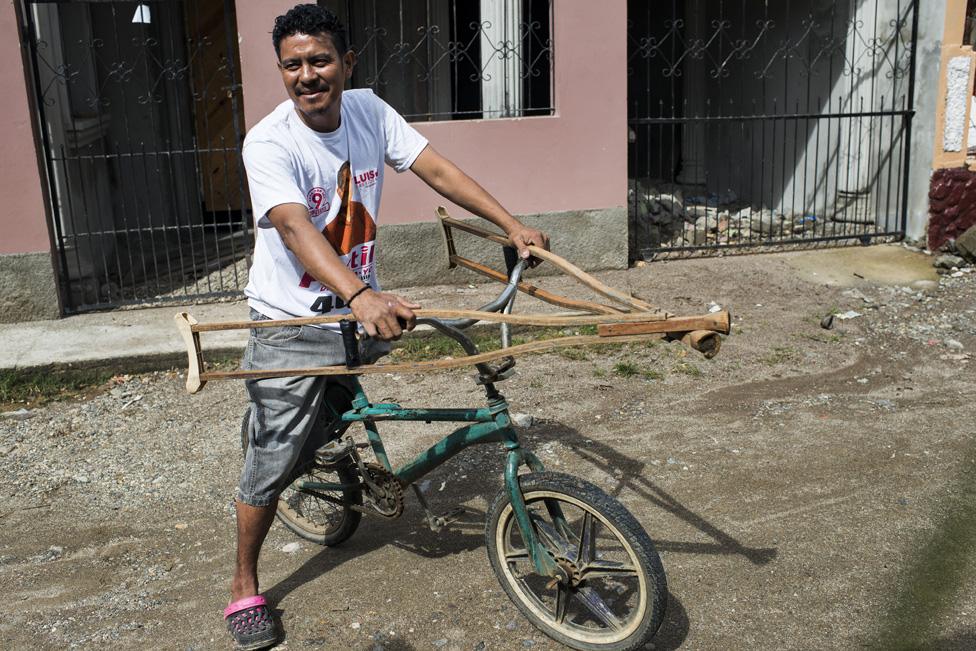
Óscar is determined to embark on the long trek even if it means walking all the way on his crutches
"I lost my leg in an accident at work two years ago. I'm a bricklayer and I fell off the second storey of a house under construction.
"Since then I've had to use crutches. I want to leave because I'm not getting any support here. I was promised a prosthesis a year ago and nothing has happened since.
"I'm not getting any work because I only have one leg. I'm living off what my brothers who're in [the US city of] Houston send me every now and then. So sometimes I have enough to eat and sometimes I don't.
"I want to leave for the US to make a living and not just scratch by. I want to leave with a caravan because that way there's more support on the way, people can help you. I'm asking God for strength to be able to make it on my crutches. I hope I don't get left behind but even if I do, I will just keep going."
'I want the best for my son' - Angie, 21
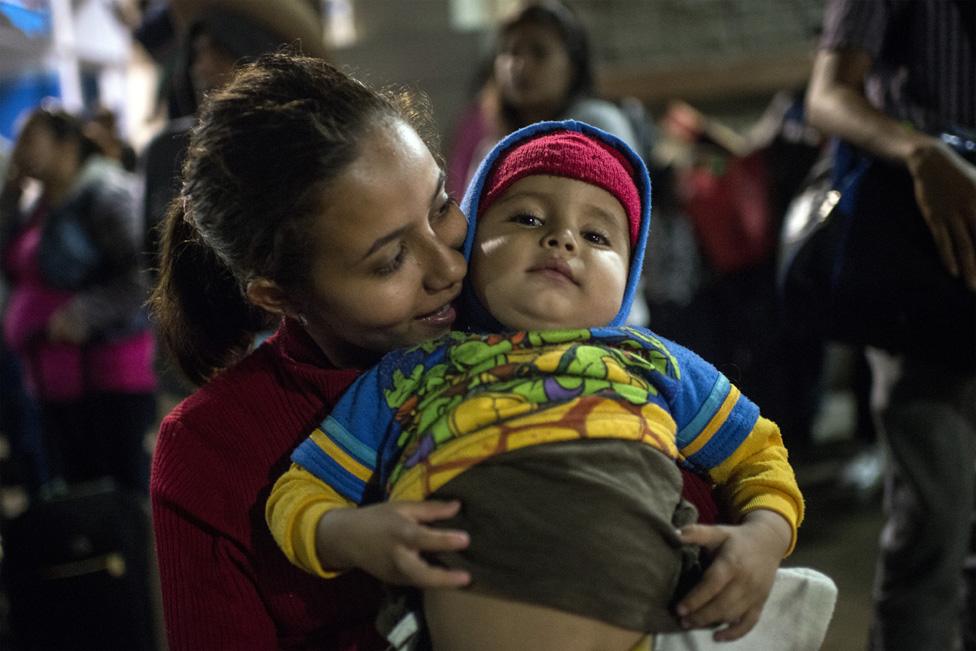
Angie only made the decision to leave recently. She is going to Mexico to work at a stall selling garlic
"There are no job opportunities here. I'm from Santa Cruz de Yojoa and I've not been able to work much.
"Now I'm going to join my aunt in [the northern Mexican city of] Monterrey. I decided only a couple of weeks ago when my aunt came back to Honduras for Christmas. She convinced me.
"She says there are lots of opportunities there. I'm not in touch with the father of my child. He hasn't helped me at all with my son. In Monterrey, I'm going to work at my aunt's garlic stall. I just want the best for my son."
'We want to fund our studies' - Five friends from Choloma
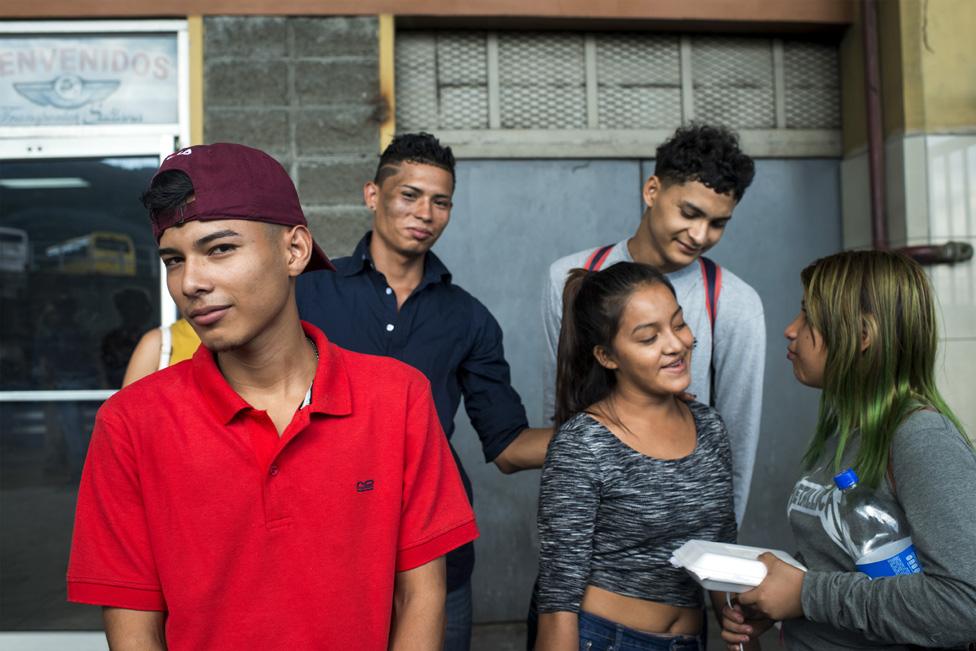
Left to right: Kevin, Juan Carlos, Keida, Elvis and Isis set off together for Guatemala where they want to join the caravan
The five friends from the industrial town of Choloma were boarding a bus in San Pedro Sula towards the border with Guatemala, where they want to join the caravan to Mexico.
Juan Carlos, 21, is the self-proclaimed leader of the group and has promised the parents of his young charges to look after them.
"We all want the same thing: to better ourselves. We want to find work to fund our studies. My dream has always been to study medicine but that has not been possible in Honduras because of my family's financial situation. I hope to find work in Mexico and save up to study."
Kevin, 18, says: "I've already been to Mexico and I know that when you go as part of the caravan, people help you. So I said to my friends: 'let's go!'. I had to go because when I was living in Mexico City I fathered a son. I want to go back for his sake. I want to get a Mexican work permit so I can pay for a lawyer. My son was born after I was deported from Mexico and he doesn't carry my surname. I want him to have my name and to provide for him so that when he grows up he doesn't say one day "my Dad didn't help me".
Isis, 14: "My parents told me to join my older sister in Tapachula, Mexico. She will meet me at the bus stop there. I'm excited about getting out of here and seeing a new place."
Keida, 16: "Saying goodbye to my parents was hard but I'm going to stay in touch with them over the phone. My main goal is to help my mum get ahead in the same way she's helped me get ahead."
Elvis, 18: "I was doing ok at home. Yes, there are youngsters killing each other and there are fights between drug traffickers and between rival gangs, but this is more about my dream, about making it for myself. My mum didn't want me to leave. Saying goodbye to her was painful, there were lots of tears."
All pictures subject to copyright.
- Published2 January 2019
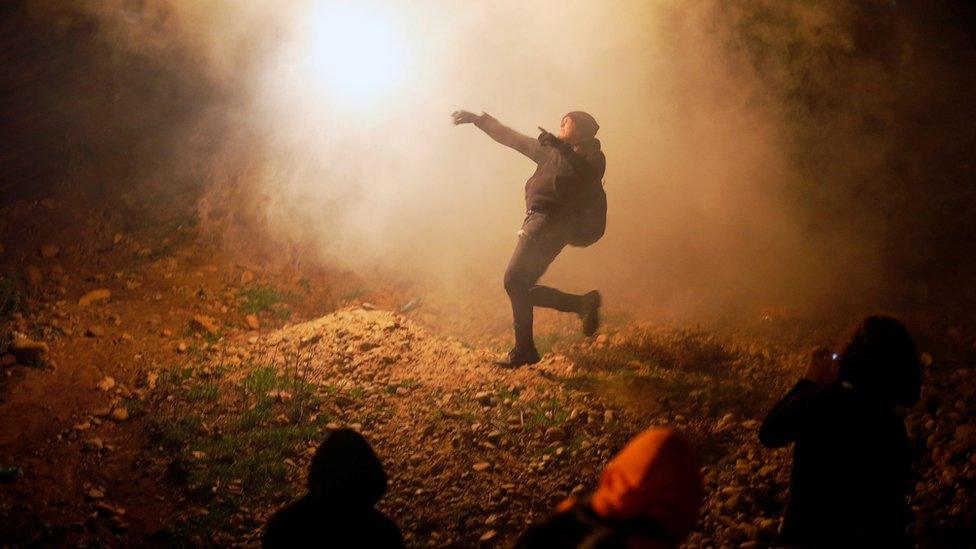
- Published28 December 2018
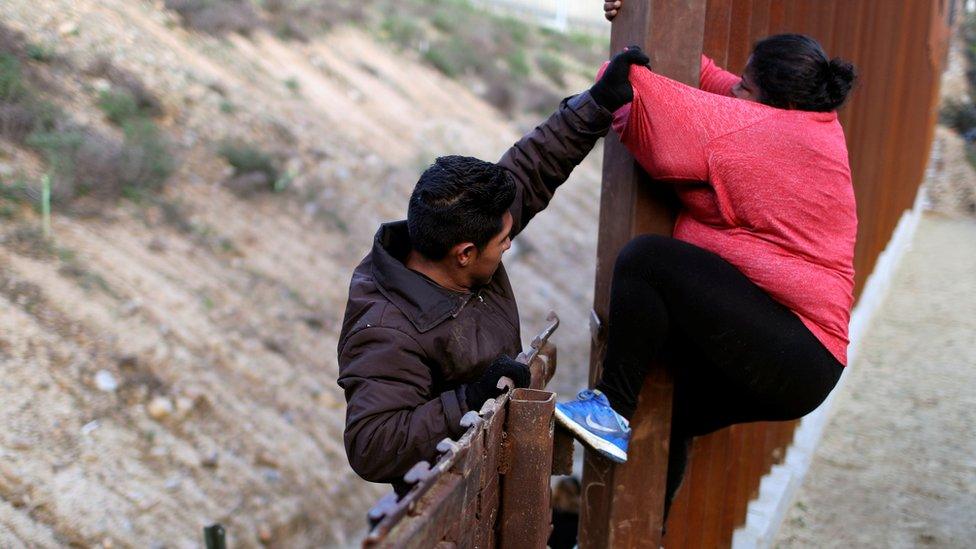
- Published26 December 2018
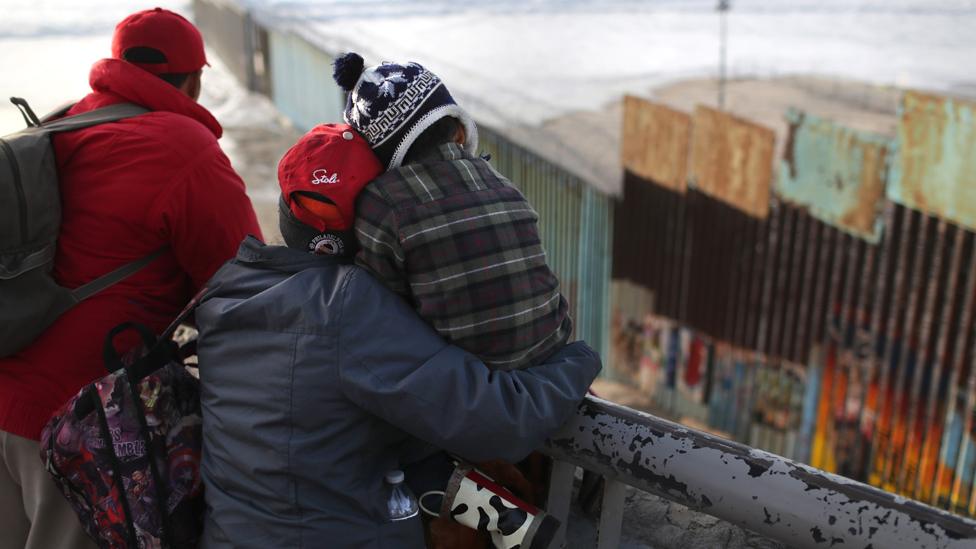
- Published21 December 2018
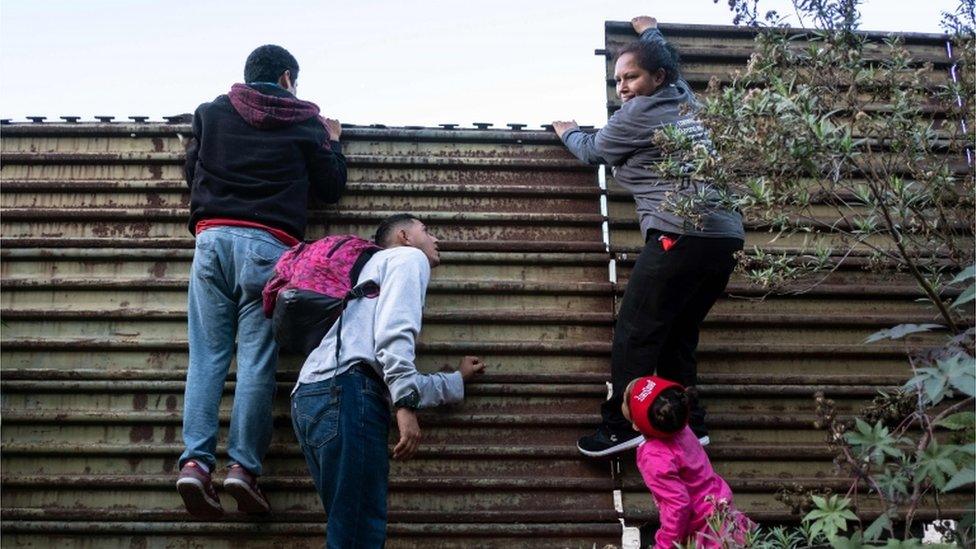
- Published14 December 2018
